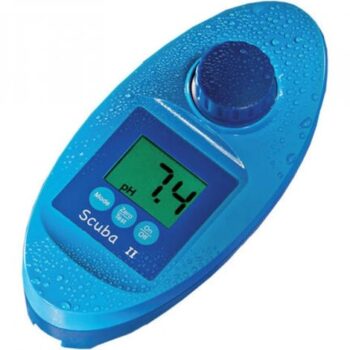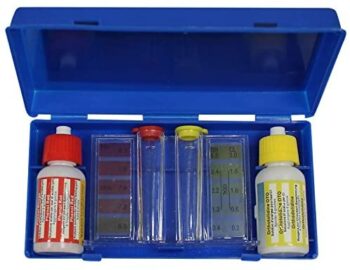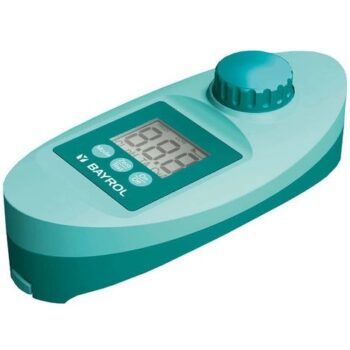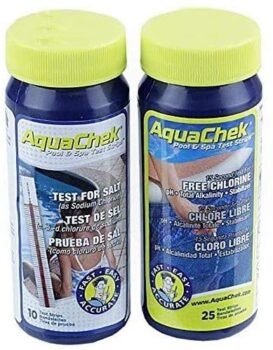Water quality and cleanliness are the guarantee of safe swimming. The use of a water quality tester is therefore essential to measure pH or chlorine content. After several hours of comparing about 30 products, we concluded that Lovibond Scuba II is the best choice. This electronic pool water quality tester displays the result with a high level of accuracy.
Here is our commitment, to make sure that we provide the best user experience and content quality:
You can support us by using our links to make your purchases (at no extra cost to you)! This sometimes earns us a commission which allows us to remain independent. More about us
Our selection
"You have the possibility to check in detail the quality of your pool water with this electronic tester Lovibond Scuba II. Simple and intuitive, it…"
"The Linxor provides an affordable and satisfactory solution for measuring chlorine, bromine and pH in pond water. Take samples from 2 or more locations to…"
"Faster and more accurate than colorimetric tests, the Bayrol 287300 offers 5 parameters such as pH, chlorine or alkalinity. With this electric photometer, your pool…"
"The classic pool water quality tester, strips are easy to use and inexpensive. The Aquachek Salt Tester stands out in this regard, being able to…"

You have the possibility to check in detail the quality of your pool water with this electronic tester Lovibond Scuba II. Simple and intuitive, it can measure 5 essential parameters at once.
95,92 £ on ManomanoLovibond offers an easy-to-use device to measure all the elements needed to keep your pool water clean. It consists of an electronic poolster, reactive tablets, an agitator and two batteries for power. Lightweight, it weighs only 165 g, which allows it to be moved around. Once the tablet is dissolved in water, the dial with large liquid crystal display sends the results almost instantly.
In addition to these features, this Scuba II tester is CE marked and comes with a 2-year warranty. It is waterproof and submersible, which makes it even easier to measure various data such as free chlorine, total chlorine, bromine, pH, alkalinity-M and cyanuric acid, after adding the reagent.

The Linxor provides an affordable and satisfactory solution for measuring chlorine, bromine and pH in pond water. Take samples from 2 or more locations to ensure reliable results.
6,32 £ on ManomanoDesigned in the UK, the Linxor liquid analysis kit measures 3 parameters in pool water: chlorine, bromine and pH. Thus, you can determine the quality of your pool water. The manufacturer provides 2 containers to take samples, but also 1 bottle of red Phenol and 1 bottle of Orthotolidine or OTO.
Of course, you have to wait 10 to 20 seconds after shaking the sample mixed with the reagent to know the result. In addition, the color code is not always easy to read. And samples must be taken from at least 2 locations to certify the reliability of the test. But this water quality tester for swimming pools based on chemical reagents fulfills its function well.

Faster and more accurate than colorimetric tests, the Bayrol 287300 offers 5 parameters such as pH, chlorine or alkalinity. With this electric photometer, your pool water will always be of good quality.
128 £ on ManomanoThe Bayrol 287300 Electronic Pool Tester monitors pH, free chlorine, total chlorine, alkalinity and stabilizer or isocyanuric acid. The unit displays results within seconds to 2 minutes, depending on the parameter being tested. No more difficult colorimetric readings. Here, the measurements are numerical and very precise.
Moreover, this electronic photometer is waterproof (IP68 certified) and does not sink. It is provided with reagent tablets corresponding to each parameter to be measured. The principle is similar to that of the Lovibond Scuba II mentioned above. And if the tablets run out, you will have no trouble finding them in supermarkets.

The classic pool water quality tester, strips are easy to use and inexpensive. The Aquachek Salt Tester stands out in this regard, being able to measure chlorine, pH, TAC and stabilizer.
10,83 £ on AmazonThis Aquachek tester kit is particularly suitable for pools treated with salt electrolysis. It measures the sodium chloride level in your pool water so that you can regulate the water if necessary. In addition to this main function, the test strips supplied also measure chlorine, pH, TAC and stabilizer.
In total, Aquacheck provides 25 strips for salt analysis and another 10 strips for the other parameters. Of course, the 2 types of strips are contained in 2 different bottles to avoid contamination. Suitable for both above ground and in ground pools, this kit requires testing the water at both ends of the pool.
Any specific needs?
The best pool water quality tester in 2021
The best entry-level pool water quality tester
The best high-end pool water quality tester
The best pool water analysis strip testers
Your guide :
Rate this buying guide :By rating this buying guide, you are helping us to reward our best writers. Thank you!
| TOP OF THE TOP | CHEAP | TOP OF THE LINE | EXCELLENT | |

In accordance with our commitment, this buying guide does not contain any sponsored products. |
 9/10 |
 8/10 |
 7/10 |
 7/10 |
| OUR SELECTION |
Lovibond Scuba II
|
Linxor Analysis Kit
|
Bayrol 287300
|
Aquachek pool electrolysis tester
|
|
You have the possibility to check in detail the quality of your pool water with this electronic tester Lovibond Scuba II. Simple and intuitive, it can measure 5 essential parameters at once.
|
The Linxor provides an affordable and satisfactory solution for measuring chlorine, bromine and pH in pond water. Take samples from 2 or more locations to ensure reliable results.
|
Faster and more accurate than colorimetric tests, the Bayrol 287300 offers 5 parameters such as pH, chlorine or alkalinity. With this electric photometer, your pool water will always be of good quality.
|
The classic pool water quality tester, strips are easy to use and inexpensive. The Aquachek Salt Tester stands out in this regard, being able to measure chlorine, pH, TAC and stabilizer.
|
|
|
Usage
|
pH, bromine, cyanuric acid, alkalinity, chlorine tester
|
pH, Bromine and Chlorine tester
|
pH, free chlorine, total chlorine, alkalinity and stabilizer tester
|
Chlorine, pH, TAC, stabilizer tester
|
|
Particularities
|
Waterproof, large screen, automatic shut-off after 5 minutes of non-use
|
Bottles supplied : 1 of red Phenol and 1 of Orthotolidine
|
Waterproof case
|
Two bottles for two types of tests
|
|
Number of tests available
|
70 tablets
|
-
|
30 tablets
|
35 strips
|
|
Type of product
|
Electronic tester
|
Analysis kit
|
Electronic tester
|
|
|
Effectiveness
|
|
|
|
|
Help us improve this table:
Report an error, request the addition of a feature to the table, or suggest another product. Thank you for your kindness!
We spend thousands of hours each year studying the major specialized websites, analyzing products of hundreds of brands and reading user feedback to advise you on the best products.
We are a product review company with a single mission: to simplify your buying decisions. Our research and testing helps millions of people every year find the best products for their personal needs and budget.
To support us you can: use our links to make your purchases (which often earns us a small commission), share our articles on social networks, or recommend our site on your blog. Thanks in advance for your support!

A pool water quality tester measures the amount of chemical elements in the water. It is mainly used to analyze acidity, chlorine, limestone, bromine, oxygen and salt. A pool water tester is designed specifically for one or more of these components. pH meters are devices dedicated to measuring pH, the unit of measurement for acidity. Chlorine level testers also measure the pH value. Multifunctional testers, usually electronic, can indicate up to 5 analyses.
There are different types of pool water quality testers. Test strips are paper tabs with different colored segments. Each segment changes color depending on the composition of the water. Chemical reagents are tablets or liquids to be reacted with a water sample. Electronic testers give the value of the indicators being tested on a digital display.
Using the strips is simple. After dipping the thin strip in water, compare the color of the segments with the color indicated on the package. The color indicated gives the content for each component tested. The chemical reagents work in the same way with a water sample. The color obtained is compared with the reference scale indicated. Electronic testers are more convenient. The reading of the result is instantaneous and precise. An LCD screen indicates the numerical value.
The
actions to be taken and the level of treatment depend on the result obtained from the water test. The accuracy and veracity of the result is therefore essential. For example, pH is measured on a scale from 1 to 14. The ideal pH value is 7.4.
The correct chlorine level is between 0.5 and 1 mg/L. The most reliable and accurate is the electronic photometer. Often used by professionals, this testing and analysis equipment is available to the general public for 100 to 200 euros. It offers more indicators than the current accessories.
The electronic pool tester remains the fastest. A probe immersed in water measures the displacement of electrons between two electrodes. The device gives accurate values corresponding to the measurements in seconds. Chemical tests such as strips and reagents take time to follow the prescribed instructions. The confirmation of the result depends on the time it takes to compare the colors. It usually takes 10 to 20 seconds.
Water is composed of hydrogen and oxygen. Although stable, this compound reacts easily with other chemical elements. That's why it's important to analyze the water quality of your pool. This is how you can verify the balance of the water.
The acidity, hardness and alkalinity of the water affect this balance. For the health of the bathers and the longevity of the pool components, avoid having water that is too hard or too soft in the pool.
The pH of the water
In chemistry, the pH or hydrogen potential indicates the concentration of hydrogen ions in water. A high pH, above 7.8, means that the water is too basic, which is conducive to the growth of algae. On the other hand, a pH that is too low, below 7.2, indicates acidic water, a source of irritation for bathers and damage to equipment. Ideally, the pH should be between 7.2 and 7.8.
The TH of the water
This indicator provides information on the hardness of the pool water. TH stands for titre hydrométrique, which is the concentration of magnesium and calcium salts. An acceptable TH should be between 10 and 25 °f or French degrees. Below 10°f, the water will be too soft and therefore corrosive. Above 25°f, the water becomes too hard and may damage equipment.
The TAC of the water
The total alkalimeter titre or TAC gives information on the buffering capacity of the water. In layman's terms, this indicator is the ability of water to absorb changes in pH. If you want to keep your pool water pH stable, maintain its alkalinity between 80 and 120 mg/L.
The rate of disinfectant
Most of the time, you use the same water source for cooking, washing and filling your pool. Depending on the upstream treatment, it contains different compounds such as chlorine, bromine, PHMB, salt and many others. Thus, you will have a water free of bacteria. But it is necessary to check the level of these elements.
The pool stabilizer
This parameter concerns only chlorine pools. Thanks to it, you can extend the life of the chlorine in your pool. For quality water, make sure that the quantity of chlorine remains between 20 and 30 mg/L.
Water temperature
Some people will be wide-eyed and wonder why they measure the water temperature in the summer. Too hot or too cool, pool water can alter the protective action of some disinfectants. The pool can then become a breeding ground for algae. Not to mention the risk of hypothermia in cold water.
When you test the pool water, start by analyzing the amount of TH and TAC, 2 indicators that have a direct influence on the pH. Adjusting them is the same as rebalancing the pH. Next, measure the pH before the disinfectant level, especially if the pool is chlorinated or brominated. Indeed, the dosage of these 2 chemical elements depends directly on the pH of the water.
Water quality testers for swimming pools, there is something for everyone. Pastilles, strips, chemical reagents, photometers, you are spoiled for choice. Here are the advantages and disadvantages of each.

Also known as test strips, test strips are thin white strips of paper divided into 3 to 6 segments. Each segment corresponds to a chemical element present in the water and will change color if measured. To find out the composition of the water, just look at the color chart provided. The big weakness of test strips is that they can easily become contaminated. Simply touching the container with wet hands can affect the reliability of the results. You will also need to follow the manufacturers' instructions carefully. Otherwise, your results will be inaccurate. The result is displayed almost instantly.
If you're looking for an inexpensive and easy-to-use pool water quality tester, test strips are an excellent choice. Even more so if your pool water is generally healthy.

It's
mostly about liquid reagents
here
. Depending on the kit you use, you will have 2 or more reagents. The provided container is used to take samples from the ends of the pool. Add a specific amount of reagent drops to it. After stirring the mixture, you will get a uniform color to check on the correspondence table. Note that there are also tablets to melt and react with the pool water. But they lack reliability. As for liquid reagents, their major disadvantage is the time needed to perform a test and the interpretation of the colorimetric results which can be hazardous.
It is a complete kit that allows to analyze the results thanks to a color table. But the analysis of water can take a lot of time with this device and it is not always easy to distinguish the shades of color. This could lead to inaccurate results. Chemical reagents offer an overall reading on the presence of a component in the pool water or just its acidity. In addition, this type of test is a better option if you regularly encounter high chlorine levels.

This type of pool water quality tester gives results to the decimal point, infinitely more accurate than color charts as opposed to reagent tests and strips. This way, you will see the exact composition of your pool water (chlorine, bromine, TH, TAC...) quickly. On the other hand, some of the elements tested will be of little or no use to you. There are 2 types of electronic water testers: pH or redox probes to be plunged directly into the pool water, or a sample taken, and photometers. The latter use test tablets, but give much more accurate results.
You should also know that most electronic testers can analyze drinking water. However, these testers are expensive. Also, avoid electronic testers with a needle dial. While strips and reagents work by colorimetry and give more or less reliable results, electronic pool testers are infinitely more accurate. Plus, you can use them to test the water you drink.
Whether your pool uses salt, PHMB, chlorine or bromine, the process of water analysis is the same. Start by taking a water sample 30 to 40 cm below the water line. Then analyze the quality of the water sampled by using the reagent (liquid, strip, tablet) or by dipping the probes in it. All you have to do is read or interpret the results and you're done.
A manual tester is an ideal alternative if you want to save money when testing your pool water. It is simple to use and requires only simple hand gestures to get a result.
But sometimes it turns out that the results are less accurate and you should analyze them yourself. It is also difficult to interpret them, especially if you use a strip, because of the shades of color that are difficult to distinguish.
A digital or electronic tester gives more accurate analysis results. It also gives exact values and is multifunctional, as a pool tester can also be used to test an aquarium, a pond, etc. But its main advantage lies in its ease of use.
However, a digital tester is much more expensive than a conventional tester. This is its only drawback.
Opting for a manual tester has a financial advantage, but if you want to obtain an optimal result that allows you to maintain your pool properly, the best thing to do is to turn to digital or electronic testers.
In 10 years, from 2007 to 2017, the number of swimming pools in the UK has increased by almost +50%, reaching 2 million private pools on the territory. Still, it is necessary to take care of them. This starts with the use of a pool water quality tester.
To analyse your pool water
Analysing your pool water is necessary for its maintenance. To facilitate this task, there are several types of pool water quality testers. All of these testers are a means of knowing the level of components present in the water. Even the change of color of the water in a pool requires analysis.
For systematic and preventive control
The pool should be treated weekly. If the weather is hot, the maintenance should be done every 1 or 2 days. To ensure that the water balance of a pool always remains stable, tests before treatment are useful. These include determining the pH value of the water, the chlorine content and the alkalinity. The other tests can be done less frequently.
To determine what treatment to do
After analyzing the water, the next step is to know exactly what treatment to do. The action can be preventive or corrective. The goal is to keep the pool clean and the water quality suitable. The level of treatment and the correct balance of the water depend on the test.
Not just for your pool!
The pool is not the only use for a pool water quality tester. Tap water, for example, may also need to be tested regularly depending on where you live. The water tester can then be used to check whether chlorine is more or less present. When the pH content increases, the water becomes a little darker.
It is a useful tool on holiday
The risks of water-related poisoning and infections are due to the use of water of uncertain composition. Water consumption and bathing on holiday are important factors in illness. A water tester in your pocket could inform you about the risks of going into unknown territory, especially when hiking or camping.
For TAC and TH, specialists recommend testing the pool water at least once a month during the peak season, i.e. in summer. For pH and disinfectant levels, test the water at least once a week if you use the pool regularly. Finally, test the stabilizer level every 6 months.
In our opinion, the best brands of water quality testers for swimming pools in 2022 are :
Owned by the Tintometer group, this brand is a reference in the field of water maintenance and analysis products. Market leader, it supplies devices and reagents to both industrial and private customers. The Lovibond pool water quality testers are great values.
Widespread and affordable, Aquackek is the first brand that comes to mind when talking about pool water analysis strips. It also offers a range of reagent tests as well as electronic testers. However, the latter have a lower quality compared to Lovibond photometers.
Bayrol was founded in 1927 in Munich, Germany. The brand began by manufacturing chemicals for industry before turning to pool water treatment. All Bayrol testers are designed and assembled in Europe, a market where its Bayrol electronic photometers are highly prized.
A subsidiary of EGK Distribution, Linxor is a French brand created in 2010. Based in Cavaillon, Vaucluse, it specializes in swimming pool equipment, waste bags and garden incinerators. Its reagents to control water quality in a pool stand out for their simplicity and versatility.
This brand has 2 particularities: it offers very low prices and specializes in chemical tests with interpretation by color chart. Its pool water analysis kits and tablets are very popular and are excellent back-up solutions when an electronic tester is not available.
The diagram below will help you to get an idea of the typical prices for each price range (entry-level, mid-range and high-end).
However, more expensive does not necessarily mean better.
We therefore advise you to always consult our ranking before deciding, rather than blindly relying on price ranges.
Consider a connected water tester
The connected water tester is composed of two elements: a water tester placed permanently in your pool and an application on your smartphone. Thanks to this system, you will be able to check the state of the water at any time without moving from your sofa. Not only is the information provided reliable and accurate, but it is also transmitted to you in real time.
Don't forget to calibrate your pool sensor
The accuracy of the measurements made on an electronic water tester relies entirely on the calibration of its probe. This must be done when the device is first put into service, during the season of use of the pool (at least twice) and after its winterization. For the procedure, refer to what is written on the water tester's instruction manual.
Store your test strips carefully
To ensure reliable results, your test strips should be kept in their original box, in a cool, dry place. It is also important to respect the maximum use date indicated on the product. Also, note that each test strip is for single use only.
Consider the storage of test fluids
Be aware that the liquid reagents in your pool water test kit must be renewed every year. Because of this, it is recommended that you dispose of opened bottles at a waste disposal facility at the end of each season. Also, these chemicals should be kept out of the reach of children.
Perform the test twice
In case some measurements seem questionable to you, don't hesitate to redo the whole test. You can even use a method other than the one usually used and compare the two results.
Every month we help more than 1 000 000 people buy better and smarter.
Copyright © 2022 - Made with ♥ by buyingbetter.co.uk
Your reviews and buying guides 0% advertising, 100% independent!